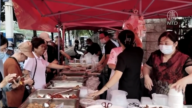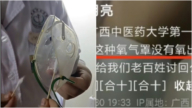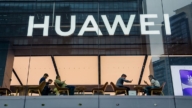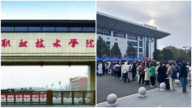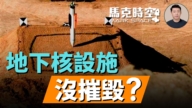【新唐人2013年11月11日讯】一名重庆网友发帖说,“我在重庆,是农村户口,我老婆在湖南,是非农村户口,现在结婚后要落到我那里,结果公安局说不能落农村户口!”这位网友的抱怨引来上百位网友的热烈讨论。 下面请看报导。
2010年在浙江义乌发生了195名公务员户口“非转农”事件。当地民间所流传的“义乌一个农村户口价值百万”的说法,其实说的是农村户口所能带来的土地利益价值百万。
据大陆媒体报导,“逆城市化”主要源于土地利益。由于过去发展城镇化、工业化以及“房地产化”,使得近年来土地大幅升值。为此,很多农民即便身在城市务工,也不愿意从农村户口变为城镇户口,因为变成城镇户口后就会失去土地,失去分享土地红利的机会。
原中央党校《学习时报》副编审邓聿文表示,在一些发达地区特别像义乌这些地方,农民户口确实比城市户口更加值钱。因为农民有土地,金钱就建立在土地上。
原中央党校《学习时报》副编审邓聿文:“义乌这个地方本来就是土地稀少,如果政府要征地,或者什么,就算是他不是按照所谓同地同价来算,它比当公务员拿两个工资要高多了。为什么讲城郊的农民一旦征地他就发财了呢,就是因为那土地值钱嘛。”
但是目前中国农民没有土地所有权,如果出售土地,只能卖给政府,而不能直接卖给开发商。北京思源社会科学研究中心总裁,80年代在国家体改委工作的曹思源表示,国家剥夺了农民土地所有权,让农民一无所有,这是为什么农民穷困的原因。
北京思源社会科学研究中心总裁曹思源:“农村的土地应该是农民的,结果合作化以后变成集体的,然后集体以后又变成官僚的,现在到底不知道这个土地是谁的了,所以问题就复杂化了。”
土地改革在三中全会之前被炒得沸沸扬扬。《经济学人》11月1号的文章呼吁中共给予农民对土地和房屋的全面所有权。长久以来,地方共产党负责人通过征用农民土地而后卖给开发商,来维持他们的财政和让他们个人致富。补偿不足和缺乏明确的土地所有权,是农民最大的抱怨。
邓聿文:“因为现在,土地你只能卖给政府,政府就是二道贩子,我等于是中间商,中间商我肯定压你,你只能卖给我,你不可能卖给别人,我可以把你的土地价格压低,然后我用高价出售给开发商。这中间赚的差价,为什么政府它乐于干这个事?因为这中间差价巨大。”
邓聿文认为,三中全会不会批准土地私有化,但是会批准同地同价的改革。所谓同地同价,就是出售土地不再需要通过政府这一中间环节,而直接卖给开发商,因此农民的土地出售跟国家的土地出售是同一个价格。
邓聿文:“应该会通过,我个人认为通过的可能性很大。因为这样的话,农民能卖地的话,一个是能把这个房价打下去,另外一个能让农民富裕起来。”
虽然中共领导人习近平和李克强誓言改革,但是大陆地方党政官员长期倚赖卖地的“土地财政”是不争的事实,在许多地方政府仍债台高筑的情况下,“新土改”要改变现状,大陆中央要如何化解地方官员的阻力?这是中共中央另一个棘手难题。
国土资源部土地勘测规划院副总工程师邹晓云对《上海证券报》说,目前土地的供应和配置都存在严重问题,“土地制度的问题都很清楚,而且整个经济的运作都与土地的供应模式密切相关,通胀问题、高房价问题也都与土地有关。”。他表示,目前各方对农村集体建设用地流转存在分歧,这意味着改革的难度比较大,但是,改革的需求也很多。
接近国土资源部的人士向《上海证券报》表示,农地流转是改革的重头戏之一,但因为问题复杂,从改革的顶层设计来看,目前尚无定论。另一位接近国土资源部的人士表示,三中全会本身涉及土地改革的内容或许有限,但在改革的方向和思路上会给予阐明。
采访编辑/秦雪 后制/李智远
Will Upcoming Land Reform Make Rural Hukou More Valuable Than Urban?
A Chinese netizen says in a post,"I live in Chongqing
with a rural hukou (household registration).
My wife comes from Hunan and has an urban hukou.
After we married, my wife wanted to move her hukou to
my hometown, but the public bureau said her hukou
could not be changed to a rural one!"
His post has led hundreds of Chinese netizens to heated debate.
Let’s have a look at the report below.
In 2010, 195 government employees in Yiwu city,
Zhejiang province, secretly changed their hukou to rural ones
on the computer system.
There has been a local saying that
“any rural hukou in Yiwu is worth over a million yuan".
This indeed refers to the land value attached to
a rural hukous in Yiwu.
Mainland Chinese media say such “deurbanization" moves
are results of land values.
Urbanization, industrialization and over-construction of
real estates have greatly raised land prices in recent years.
Consequently, rural workers have become unwilling to move
their hukou into cities even if they work there.
The reason is, once their hukou become urban they will
automatically lose lands and therefore chances to benefit
from surging land prices.
Zheng Yuwen, former deputy editor of Central Party School
publication Study Times, says that the value of a rural hukou
can be much higher than that of an urban one
in developed regions such as Yiwu.
This is because rural residents have land, which itself
is worth a lot of money.
Zheng Yuwen, former deputy editor of Study Times
magazine:"In Yiwu the land resource is pretty scarce.
When local government expropriates farm lands for
construction, the compensation is much higher than
average income of governmental employees,
even if it is not calculated at the average market
land price of the region."
However, a problem is that currently rural Chinese residents
have no land ownership.
They are only allowed to sell lands to the government,
but not to developers.
Cao Siyuan, CEO of Beijing Siyuan Social Science Research
Center and a former member of the State Council
economic reform committee,
says that the Chinese Communist Party (CCP) has deprived
peasants of land ownership, which is almost all they have.
That is why Chinese peasants are so poor.
Cao Siyuan, Beijing Siyuan Social Science Research Center
CEO: “Peasants should own the lands in rural regions.
But through the movement of People’s Communes,
the ownership became collective, and then bureaucratic.
Now nobody exactly knows who has the ownership and
therefore the problem has become complicated."
The land reform issue was a hot topic before
the Third Plenary Session.
In a Nov. 1 article, the Economist Intelligence Unit (EIU)
called on the CCP authorities to return full house
and land ownership to peasants.
For a long time, local party leaders have generated revenue
and gotten rich through taking land from peasants
and selling it to developers.
Insufficient compensation and unclear land ownership are
the top complaints from peasants.
Zheng Yuwen: “Right now, peasants can only sell lands
to the government.
So the government really plays the role of an intermediary.
As the middleman they will squeeze benefits for sure
because peasants cannot sell the lands to anyone else.
They can lowball the land price and then sell to developers
at a much higher price, making huge profits.
Why are local governments so active in doing this?
The answer is simply the huge profits.”
Zheng says the Third Plenary Session
will not approve private land ownership,
but will approve reform of “Same Region, Same Price".
The so-called principle of"Same Region, Same Price"
will allow peasants to bypass the “middlemen” that are
local governments and directly sell lands to developers.
This also allows peasants to sell their lands
at the same prices that the authorities do.
Zheng Yuwen:"I think there is a good chance it’ll be approved.
Because allowing peasants to sell lands will, for one thing,
lead to lower housing prices, and secondly,
it will increase rural household incomes."
Although the CCP leaders Xi Jinping and Li Keqiang made
their promise of carrying out reforms,
it is an undeniable fact that local party officials have
become accustomed to relying on land sales for revenue.
With the huge amounts of debts owed by many local
governments, how will the central government overcome
resistance from local officials to make real changes
with land reforms?
This is another big trouble for the party leaders.
Zou Xiaoyun is a deputy chief engineer of Land Surveying
and Planning Institute at the Ministry of Land and Resources.
Zou told Shanghai Security News that there are currently
serious land supply and allocation problems:
“The problems of the current land system are very clear.
More importantly, the land supply system is closely
related to the entire economy, as well as issues such as
inflation and high house prices."
Zou also revealed that there were still disagreements about
the transfer of collective-owned farm lands for construction.
This indicates that implementing reform is still difficult
despite the many demands for it.
A source related to the Ministry of Land and Resources told
Shanghai Security News that farm land transfer is a main
part of the reform plan.
However, top-level reform plans still come to no conclusive
point on this issue due to the complexity of the problems.
Another source revealed that the Third Plenary Session may
only touch land reform to a limited extent,
but will clarify the direction for future reform plans.


